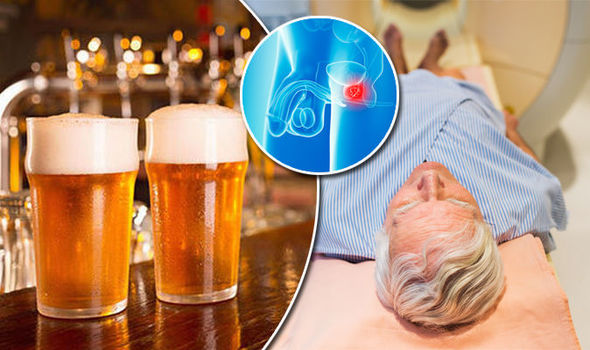Source: Thailand Medical News Oct 26, 2019 6 years, 3 months, 4 weeks, 19 hours, 54 minutes ago
A study conducted by University of Montreal Health Center has shown that
beer consumption by men is linked to a higher risk of
prostate cancer. The findings indicate that of many men suffering from advanced-stage
prostate cancer appear to share at least one thing in common: they are now or have been heavy drinkers of
beer. The study was led by renowned uro-oncologist Dr Pierre Karakiewicz, a professor of urological surgery at University of Montreal’s Faculty of Medicine.

Published in Cancer Epidemiology journal, the study found a link between the occurrence of advanced-stage
prostate cancer and a heavy intake of
beer over a lifetime. Specifically, the study determined that drinking more than 63
beers a year over a period of 20 to 35 years increased the risk of developing advanced-stage
prostate cancer by 38 to 49 per cent, depending on the quantity consumed.
The research study was based on a sample of 3,927 men living in Greater Montreal, with an average age of 64 years. One of the unique characteristics of this study is that it is population-based, giving added relevance to the association between alcohol intake and the development of
prostate cancer, particularly for men with the heaviest alcohol consumption.
Dr Karakiewicz and his colleagues Dr Marie-Elise Parent and Dr Claire Demoury first identified all the cases of men diagnosed with
prostate cancer in the Greater Montreal area between 2005 and 2009. A total of 1,933 men with this type of cancer took part in the study, representing 80 per cent of the cases diagnosed in Montreal. Since this was a “case-control” study, another 1,994 men from Montreal who did not have
prostate cancer were selected as the control group. In-person interviews were conducted with each of the participants. They were asked about their lifestyle, diet, physical activity, and alcohol consumption habits, including the quantities and types of alcohol consumed over their lifetime.
Surprisnglyl, the researchers found no significant association between heavy consumption of all types of alcohol and
prostate cancer. However, the results were very different in the case of heavy drinkers of
beer.
Dr Karakiewicz, who is director of the
Cancer Prognostics and Health Outcomes Unit at the University of Montreal Health Center (CHUM) commented in an interview with
00"> Thailand Medical News, “Men in the upper quartile of beer consumption (over 63 drinks per year over several decades) had a 40% increased risk of advanced
prostate cancer compared to the control group.”
“Our model shows that for a man who starts drinking at the age of 18 and drinks more than two
beers every week, the risk of a high-grade prostate cancer appears at the age of 65. If he drinks more than three
beers a week, the risk emerges at 50 years of age. At least one out of five participants in the study consumed
beer at levels above what is considered safe.” he added.
Given that the cumulative consumption of
beer over a lifetime appears to be a predictor of disease, he believes that it should be taken into account by physicians and urologists when seeing patients. The researchers have not yet been able to clearly identify the mechanism responsible for the greater risk of advanced
prostate cancer in heavy
beer drinkers specifically.
Dr Karakiewicz further added in the interview, “We know that acetaldehyde, the first metabolite of ethanol, which is released by alcohol, is a carcinogenic that can promote cancer development by different mechanisms, including interference with DNA replication,”
Other hypotheses point to the possibility that high alcohol consumption can cause folate deficiency (vitamin B) or lead to immunosuppression that may facilitate the spread of tumours.
Surprisingly, the study found that certain consumption of other certain spirits such as Gin, Brandy and Whisky actually lead to a 25% lower risk of
prostate cancer. The researchers however downplayed this observation ans said that more research and investigation is needed to verify this observation.
Reference: Claire Demoury, et al., “Association between lifetime alcohol consumption and prostate cancer risk: A case-control study in Montreal, Canada,” Cancer Epidemiology, 2018; doi:10.1016/j.canep.2016.09.004 